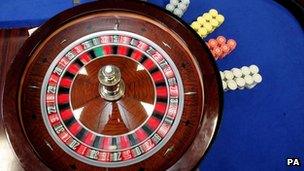Gambling laws inconsistent and in limbo, says Hunt
- Published

Mr Hunt said there would not be fresh legislation on gambling despite inconsistencies in current laws
Jeremy Hunt has said UK gambling laws are "inconsistent" but ruled out any imminent changes amid concerns over how best to tackle the issue of addiction.
The culture secretary said there were questions about how the 2005 Gambling Act, which liberalised the sector, was operating and this was not "healthy".
In some areas, such as casinos, policy was "in limbo", he told MPs.
Plans for a major expansion of casinos under Tony Blair were scaled back by his successor Gordon Brown.
Legislation which came into force in 2007 relaxed some of the regulations surrounding gambling, including restrictions on betting shops, casinos and online gambling operators advertising on TV and radio.
'Not a success'
Critics of the bill feared it would increase cases of problem gambling and the bill was diluted to reduce the number of new regional "super casinos" licensed to one, and smaller casinos to 16.
The legislation also created the Gambling Commission, which is responsible for regulating all gambling - apart from the National Lottery - spread betting and protecting vulnerable adults and children.
Appearing before the Commons culture committee, Mr Hunt said there was a problem with how existing laws were operating.
"I think the truth is that it (the 2005 Act) has not been a success and, as a result, in things like casino policy we are in a kind of limbo at the moment which I don't think is healthy.
"There are a number of unanswered questions in terms of the way the Gambling Act is being implemented."
Conservative MP Philip Davies said there were anomalies in existing laws, such as the number of games machines allowed in casinos, compared with High Street bookmakers.
He asked Mr Hunt asked whether the government had an appetite for tackling some of the weaknesses in existing legislation or whether it was "paralysed by what might be known as the Daily Mail syndrome".
Mr Hunt said the newspaper and other organisations were rightly concerned about the threat of gambling addiction.
While the government had nothing against responsible gambling and "having a flutter was part of our national life", Mr Hunt said containing levels of problem gambling was its priority and would be central to any future legislative changes.
"There are inconsistencies in gambling legislation. And a lot of the reluctance to change things is because of people's concern [that] in some countries that have liberalised laws they have seen quite significant growth in problem gambling at the same time.
"That is the big question that needs to be addressed before any progress is made."
Lottery concern
Separately, Mr Hunt also said he was looking into the impact of a commercial lottery game launched last month.
The Health Lottery, run by the Northern & Shell media company which owns Express newspapers and Channel 5, is offering a top prize of up to £100,000 and says it hopes to raise £50m a year for health causes across the UK.
Charitable organisations have raised concerns about the lottery which will donate 20.34p per £1 ticket to charity compared with 28p for every National Lottery ticket.
Mr Hunt told MPs: "I am worried about the health lottery because protecting the income for good causes is a very important responsibility this government has and the National Lottery was set up in a way which would generate money for good causes."
"Society lotteries are allowed on the basis they are local lotteries and I want to be sure - and we are doing some work - to look into what the impact of the health lottery may be on good cause revenues."
Pressed by Conservative MP John Whittingdale on whether the health lottery was legal, Jonathan Stephens - the top civil servant at the Department of Culture - said that was a matter for the Gambling Commission.
Mr Hunt added: "If they concluded what was happening was not legal, I would expect them to take robust action."
Martin Hall, head of the Health Lottery, said in its first three weeks more than £1m has already been donated to charities and the Health Lottery launch had helped boost sales in the national lottery too.
The Health Lottery delivered a more even spread of funding across the country, he added, whereas the National Lottery's funding was disproportionately allocated within the M25.
The Gambling Commission would not comment on individual cases.
- Published27 September 2011